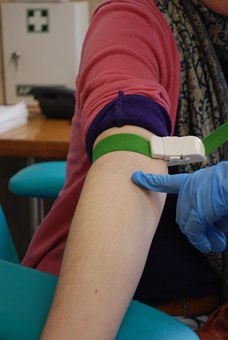People with Type 1 diabetes spend a lot of time getting poked.
Their blood needs testing both for regular laboratory monitoring of their blood sugar control as well as their cholesterol levels.
For the cholesterol test, known as a lipid profile, that requires fasting the night before – up to 12 hours before the test is done the next day.
Fasting before a blood test may not just cause hunger pangs. In some patients’ cases, such as those with diabetes, it is also potentially risky. Excessive fasting before a test could send diabetics’ blood sugar levels down and require a recovery period.
However, routine blood tests for everyone have now become a lot more convenient. Lab requisitions in BC must now indicate that fasting is no longer required for lipid testing.
Non-fasting lipid tests to benefit more than a million British Columbians
The impact of the switch to non-fasting tests is huge. There are more than 1.2 million partial and full lipid profiles done each year in the province.
Dr. Gordon Francis, Director of the Healthy Heart Program Prevention Clinic at St. Paul’s Hospital, is excited about what this means for patients. “This is so much more convenient for patients and now there is no need to wait at all to get your blood work done. For example, a patient can go straight from their doctor’s office to the lab, rather than sitting on a lab requisition at home for months because of the hassle of fasting. There is also no need to abstain from alcohol. Previously, that was required for lipid tests.”
Most importantly, Dr. Francis points out, there is robust evidence showing results from non-fasting lipid tests are more useful. “The non-fasting results are better predictors of heart attack, stroke and total mortality when compared to fasting results. This switch will have a very large impact.”
Non-fasting lipid tests predict coronary heart disease better than fasting tests
A commentary paper for the Canadian Medical Association Journal he recently co-authored reiterates other high-quality studies have in fact shown that non-fasting lipid levels are better predictors for coronary heart disease and stroke than fasting lipid levels. “The non-fasting profile captures other harmful lipids that are present after eating, but not when fasting, that contribute to risk for heart attack, stroke and overall mortality,” explains Dr. Francis.
The non-fasting guidelines have already been in use in Denmark since 2009 and the UK since 2014. They were actually adopted by the Canadian Cardiovascular Society in 2016, with a couple of provinces following in some capacity starting around that time. But it was only recently accepted officially by the BC Ministry of Health, with all labs in the province mandated to change their lab requisition forms by the end of 2018.
Dr. Andrew Don-Wauchope, VP Clinical Affairs from LifeLabs Laboratory Services, agrees that this change has been a long time coming. “Wider adoption of this method will help to make great strides for enhancing the patient experience. This change to the lab requisition form will lead to a positive change that supports patient-centred care for British Columbians.”





